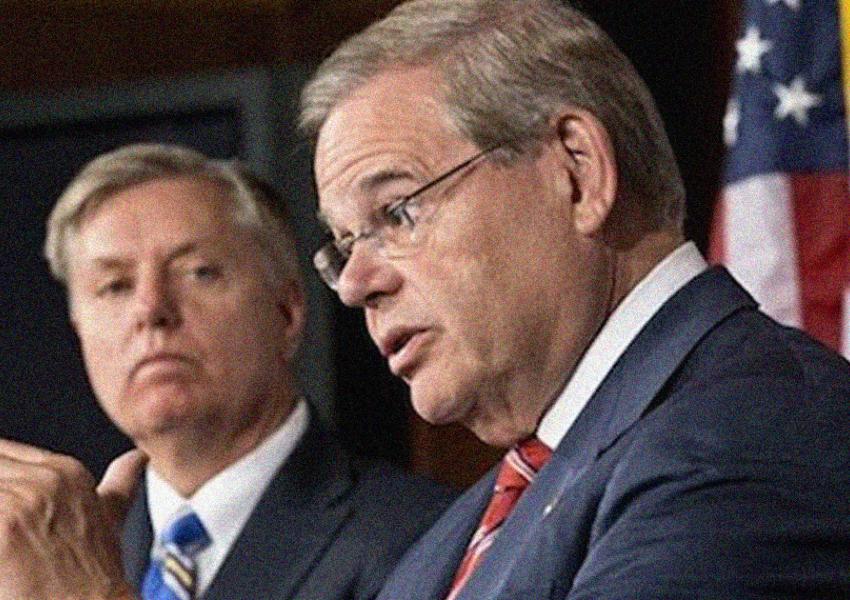
Draft Letter Circulates In US Senate Backing Pressure On Iran
The battle in Washington over Iran policy continues with AIPAC, the influential pro-Israeli lobby group, calling on Senators to sign a draft letter to President Joe Biden opposing the revival of the 2015 Iran nuclear deal in its current form.
Lobbying for signatures is led by Lindsey Graham, a Republican and staunch supporter of former president Donald Trump, and Bob Menendez, who opposed the 2015 deal, known as the JCPOA (Joint Comprehensive Plan of Action).
According to IPAC, Democrats Chris Coons, Joe Manchin and Ben Cardin have joined 18 Republicans in supporting the letter as of Friday [March 19]. A draft of the letter calls on President Joe Biden to use “the full force of our diplomatic and economic tools in concert with our allies on the United Nations Security Council and in the region to reach an agreement that prevents Iran from ever acquiring nuclear weapons and meaningfully constrains its destabilizing activity throughout the Middle East and its ballistic missile program.”
In a text to supporters, AIPAC said that the letter expressed a “bipartisan consensus” over the threat of a “nuclear-armed Iran,” so rejecting the argument of JCPOA supporters that reviving the agreement, which the Trump administration abandoned in 2018 before imposing draconian sanctions, would effectively restrict Iran’s atomic program.
JCPOA critics argue that Biden should maintain Trump’s ‘maximum pressure’ to force Iran into ending uranium enrichment, abandoning missile defense and breaking links with regional groups and allies it backs.
Choreographing Moves
While Biden came to office committed to reviving the JCPOA, his administration has reached an impasse where its demands for Iran to reverse nuclear steps beyond the JCPOA are met with Tehran insisting the US, as the one that broke the deal, should first return to JCPOA structures and lift sanctions.
Biden’s Iran envoy, Rob Malley, this week accepted the need – highlighted in December by Rafael Mariano Grossi, head of the International Atomic Energy Agency – “on choreographing, on synchronizing” moves by both Tehran and Washington to revive the JCPOA.
Malley and other officials have reiterated their commitment is to revive the JCPOA while seeking a follow-on agreement on other issues. Earlier this month, State Department spokesman Ned Price responded to a bipartisan letter from 140 members of the House of Representatives urging the continuation of ‘maximum pressure’ by saying the JCPOA would be used “as a platform to negotiate…agreements that would cover other areas of concern…”
Debate Set To Intensify
Supporters of the JCPOA in Washington argue that other issues like missile defense − given the arsenals of Saudi Arabia, the United Arab Emirates and Israel − are better kept distinct from the proliferation risks of Iran’s nuclear program. The advocacy group Win Without War this week urged senators not to sign the Graham-Menendez letter as it set impossible standards and “would undermine diplomacy.” Sina Toosi, of the National Iranian American Council (NIAC), called the two senators “regime-change hawks.”
The debate in Washington is set to intensify. Nine House members recently called on the FBI to investigate Iranian-American groups for secret funding by Tehran. Menendez was among senators who this week joined a virtual discussion hosted by the Organization of American Communities, an affiliate of the Mujahedin-e Khalq, an Iranian diaspora-based opposition group.
In Tehran, Fars and Tasnim, news agencies broadly aligned with the principlists, covered the senators’ letter as important news with a tone suggesting it showed US untrustworthiness. Some anti-JCPOA strategists in Washington have said their campaign is as much over frightening off potential investors in Iran and encouraging opposition in Tehran to the JCPOA as influencing the Biden administration.





